

2011 ended with the alarming approval of the National Defense Authorization Act by the US Congress, which places ultimate authority on the President of the United States to decide on the indefinite military detention of terrorism suspects worldwide. The bill was signed on New Year’s Eve, its strategic timing reminiscent of the date set for Bradley Manning’s pre-trial hearing, which also took place during last year’s holiday season.
As of the 1st of 2012:

This is a "WikiLeaks News Update," constantly updated throughout each day. The blog tracks stories that are obviously related to WikiLeaks but also follows stories related to freedom of information, transparency, cybersecurity, and freedom of expression. All the times are GMT.
05:30 PM Julian Assange’s extradition hearing is only two days away. Fair trial for Julian Assange in case he gets extradited?
05:00 PM During today's ‘Free Assange ! End the Wars !’ public meeting in London, Peter Tatchell encouraged everyone to send letters of support to Bradley Manning:
If you haven't written to Bradley Manning, please do so - and ask your friends to.
Also, as a reminder, there are only 9 days left to contribute towards a Bradley Manning billboard in Kansas. Click here if you wish to help.
All human progress has been based on brave people putting themselves at great personal risk, I believe Bradley Manning and Julian Assange are such people. - Peter Tatchell
04:50 PM Wikileaks partner in Pakistan, Dawn, reveals the Musharraf regime's efforts to stop Iran’s nuclear weapon program.
Based on the frequency of reporting to American officials on the issue, toeing the US line seems to have been one motivation for this deep involvement. But in an April 2006 meeting with US Senator Chuck Hagel, Mr Kasuri provided a list of other reasons why Pakistan was so keen to prevent Iran from acquiring nuclear weapons.

This is a "WikiLeaks News Update," constantly updated throughout each day. The blog tracks stories that are obviously related to WikiLeaks but also follows stories related to freedom of information, transparency, cybersecurity, and freedom of expression. All the times are GMT.
10:10 PM Senator Youri Latortue threatens to file lawsuit against newspaper Haiti Liberté for its reports on a diplomatic cable, where he is described as a mafia boss, a drug dealer and a poster-boy for political corruption.
09:55 PM According to The Guardian, Julian Assange's autobiography deal has collapsed in its original form, after Julian told publishers that his book could 'give ammunition to US prosecutors'. Story is yet to be confirmed, in fact a Canongate spokeswoman stated the contract is 'very much alive'.
09:25 PM New York Magazine has published the unredacted chat logs that were used in their feature Bradley Manning’s Army of One .
08:55 PM Crisis in Pakistan’s energy sector had been anticipated in a series of diplomatic cables dating from 2008, where U.S. Ambassador Anne Patterson notes ‘a lack of coordination and absence of any clear line of authority’ on the basis of unefficient policymaking in the sector :
 Those who read President Barack Obama’s speech will likely be reading to find hints of when the conflict might finally come to an end. Support for a pullout from Afghanistan is at an all-time high, according to a recent Pew Research Center poll. But, there is little reason to put much stock in the fact that ten thousand troops will be leaving Afghanistan this summer. Withdrawing a number of troops around July of 2011 was always part of a plan, a way of deftly managing public opinion.
Those who read President Barack Obama’s speech will likely be reading to find hints of when the conflict might finally come to an end. Support for a pullout from Afghanistan is at an all-time high, according to a recent Pew Research Center poll. But, there is little reason to put much stock in the fact that ten thousand troops will be leaving Afghanistan this summer. Withdrawing a number of troops around July of 2011 was always part of a plan, a way of deftly managing public opinion.
When Obama went ahead and added thirty thousand troops, he knew, as shown in Bob Woodward’s book Obama’s Wars he had two years with the public. He understood the perils of escalating a war, as retired Lt. Gen. Karl W. Eikenberry, retired Gen. James L. Jones and Lt. Gen. Douglas Lute all offered a level of dissent against Admiral Mike Mullen, Gen. David Petraeus and Defense Secretary Robert M. Gates. And, Obama allegedly told Vice President Joe Biden in private to oppose a big troop buildup but could not stand up to military brass. In the end, though, he was able to set a withdrawal timetable of ending the war by 2014.
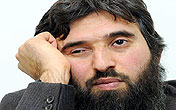 Omar Deghayes was born the son of a prominent Libyan lawyer, an "opponent of the increasingly totalitarian Gaddafi" later taken away by the Libyan authorities and killed. After his father's death, Omar Deghayes settled with his family in Saltdean, Great Britian. As a British resident and student of law, Deghayes was imprisoned in Guantanamo for six years after he was abducted from Pakistan and sold for bounty to the United States military. As many of his interviews rightly point out, Mr. Deghayes lost an eye after it was gouged by a Guantanamo guard.
Omar Deghayes was born the son of a prominent Libyan lawyer, an "opponent of the increasingly totalitarian Gaddafi" later taken away by the Libyan authorities and killed. After his father's death, Omar Deghayes settled with his family in Saltdean, Great Britian. As a British resident and student of law, Deghayes was imprisoned in Guantanamo for six years after he was abducted from Pakistan and sold for bounty to the United States military. As many of his interviews rightly point out, Mr. Deghayes lost an eye after it was gouged by a Guantanamo guard.
You were captured and detained between May 2002 and Dec 2007?
2007 May...April? Yes. I think. Probably May or April…yes.
Do you recall where you were held? Were you going from one camp to another? Do you remember those dates...?
No. It's going to be very difficult because when we were in the prisons in Guantanamo, we had no idea of dates or time.
It was difficult to...we didn't have any watches. We weren’t allowed to know dates or things...I think until 2005, when the lawyers started to come in…we started to have some idea of the dates.
And then after that I think 2006 we were allowed to know what time...they had time...a big clock hanging in some of the...not the cells...but in the middle in between the cells. So, it would be difficult to say which dates I was in which prison and so on...
Do you have a recollection of the places that you were actually held?
Yes. Yes. I do. Yes. Even though we weren't allowed to even know that. But we eventually did know where we are.
Where were you first?
I was first in Lahore. I was kept in Lahore prison for two months. And I think it was a maximum security in Lahore. Kind of a fortress, which is made special for, I think, terrorism cases and things like that. There are some Pakistani people there. And some Arabs.
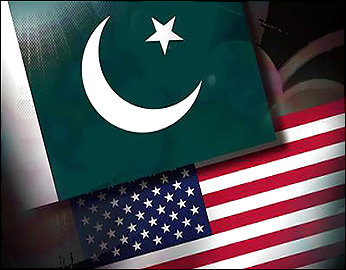 The Dawn Media Group in partnership with WikiLeaks has been releasing the "Pakistan Papers." Thus far, some of the revelations include the following: US was concerned that Pakistan would oppose its policies at the United Nations; US was worried Pakistan would purchase oil from Iran, allowing them to get a foothold in Pakistan; Pakistan's government was upset with US funding for the Pakistan military, which led to increased civil-military tensions; Pakistan's military asked for continued drone coverage; the US has had troops deployed on Pakistan soil; Saudi Arabia and the UAE have been financing jihadist groups in Pakistan and the US did not provide Benazir Bhutto with proper security.
The Dawn Media Group in partnership with WikiLeaks has been releasing the "Pakistan Papers." Thus far, some of the revelations include the following: US was concerned that Pakistan would oppose its policies at the United Nations; US was worried Pakistan would purchase oil from Iran, allowing them to get a foothold in Pakistan; Pakistan's government was upset with US funding for the Pakistan military, which led to increased civil-military tensions; Pakistan's military asked for continued drone coverage; the US has had troops deployed on Pakistan soil; Saudi Arabia and the UAE have been financing jihadist groups in Pakistan and the US did not provide Benazir Bhutto with proper security.
For this episode of "This Week in WikiLeaks," the show has part two of an interview that was done with Raza Rumi, a writer based in Lahore, Pakistan. Rumi regularly writes for the Pakistani weekly The Friday Times, The News and Daily DAWN on myriad topics such as history, arts, literature and society. Rumi has worked in Pakistan and abroad in various organizations including multilateral institutions such as the United Nations.
Rumi's writing can be read here.
[*Note: This is the second part of "This Week in WikiLeaks" for the week. You'll find part one, an interview with Kevin Zeese of the Bradley Manning Support Network on the one year anniversary of Manning's arrest here.]
To hear the show, click play on this embedded player.
 The Dawn Media Group in partnership with WikiLeaks has been releasing the "Pakistan Papers." Thus far, some of the revelations include the following: Pakistan's military asked for continued drone coverage, the US has had troops deployed on Pakistan soil, Saudi Arabia and the UAE have been financing jihadist groups in Pakistan and the US did not provide Benazir Bhutto with proper security.
The Dawn Media Group in partnership with WikiLeaks has been releasing the "Pakistan Papers." Thus far, some of the revelations include the following: Pakistan's military asked for continued drone coverage, the US has had troops deployed on Pakistan soil, Saudi Arabia and the UAE have been financing jihadist groups in Pakistan and the US did not provide Benazir Bhutto with proper security.
For this episode of "This Week in WikiLeaks," Raza Rumi, a writer based in Lahore, Pakistan, joins us. He regularly writes for the Pakistani weekly The Friday Times, The News and Daily DAWN on myriad topics such as history, arts, literature and society. Rumi has worked in Pakistan and abroad in various organizations including multilateral institutions such as the United Nations. His day job comprises working as a policy adviser and development practitioner. As a policy expert, Raza works with international development institutions, government agencies and leading Pakistani NGOs. He is also an adviser to an Asia Pacific governance network and serves on the editorial board of Journal of Administration and Governance and contributes to various publications in Pakistan and abroad.
Rumi's writing can be read here.
To hear the show, click play on this embedded player.
 A new batch of US State Embassy cables released specifically dealing with the US relationship with Pakistan draw attention to a number of Pakistani political issues, the military aid the US has been giving Pakistan, the deployment of US troops in Pakistan and the growing conflict between India and Pakistan, which the US appears to be gaming to advance its own foreign policy.
A new batch of US State Embassy cables released specifically dealing with the US relationship with Pakistan draw attention to a number of Pakistani political issues, the military aid the US has been giving Pakistan, the deployment of US troops in Pakistan and the growing conflict between India and Pakistan, which the US appears to be gaming to advance its own foreign policy.
The release is the product of a partnership between the Dawn Media Group and WikiLeaks that began in the last week of April of this year. Around 4,000 cables are to be released over the next few weeks.
There are numerous ways to begin to examine the cables. This post covers the use of drone technology in Pakistan.
Kayani Asks US to Loan Pakistan Unmanned Air Vehicles (UAVs)
The cable getting attention is 08ISLAMABAD609 sent out by Anne W. Patterson on February 11, 2008. It details a meeting between Pakistan General Ashfaq Kayani, Chief of Army Staff, and US CENTCOM Commander and Admiral William J. Fallon on January 22. During the meeting, the two discuss expanding military assistance and training along with improving cooperation in Afghanistan.
Kayani asks Fallon to assist in providing “continuous Predator coverage of the conflict area.” Fallon is unable to offer the “assets to support his request” but offers Joint Tactical Aircraft Controller (JTAC) support for Pakistani aircraft. Kayani does not find this offer politically acceptable.
 FROM THE CABLES/GITMO FILES
FROM THE CABLES/GITMO FILES
Dominique Strauss-Kahn may be just one of many diplomats or international officials alleged to have abused maids or nannies in the United States:
In April 2007, a Tanzanian maid filed a lawsuit against Alan Mzengi, a minister-counselor at the Tanzanian Embassy. She alleged the Mzengis kept her as “a virtual prisoner in their residence, stripping her of her passport, refusing to permit her to leave the house unaccompanied.” The lawsuit states she was not paid for her four years of work.
On this case, Reuters reports a US State Embassy cable from December 2009 shows the US government asked the Tanzanian government to investigate saying, “While payment of the lost wages to Ms. Mazengo is our first priority, we also hope that any diplomat who has treated his domestic staff in such an abusive manner would face appropriate sanction upon his return home," the cable said.
The State Department continues to monitor a possible Tanzania investigation and claims it will be getting “tough on alleged abuse of domestic workers by foreign diplomats.”
Cables deal with Canadian electricity:
One story out from CBC reports that Prince Edward Island utility Maritime Electric was part of Hydro-Québec's plans for purchase of NB Power. In October 2009, as the New Brunswick government was considering a $4.8 billion deal that was politically unpopular, the possibility of a sale was denied. The cables show it was seriously considered.
 Julian Assange Says Whistleblowers “Heroes,” WikiLeaks Played “Significant Role” in Recent Arab Uprisings As He Accepts Sydney Peace Prize
Julian Assange Says Whistleblowers “Heroes,” WikiLeaks Played “Significant Role” in Recent Arab Uprisings As He Accepts Sydney Peace Prize
Julian Assange, founder of WikiLeaks, was awarded the Sydney Peace Model at the Frontline Club in London. The award was given to recognize his work for “greater transparency and accountability of governments.” @Asher_Wolf covered the event on Twitter.
Assange said, “WikiLeaks is the most scrutinized organization per capita in the world,” and that he was in “the absurd situation of receiving the Sydney Peace Prize in London whilst wearing a surveillance device” around his ankle. He noted that the submission site for WikiLeaks is being re-engineered as a result of “sabotage and website attacks.” Also, Assange acknowledged that coverage of releases from WikiLeaks could devolve into newspapers attacking each other.
Below is video of Assange accepting the medal:
 Edited podcast now posted.
Edited podcast now posted.
This week's podcast features Michael K. Busch, who teaches international relations at the City College of New York, where he is also program coordinator at the Colin Powell Center for Policy Studies. He has been covering the Gitmo Files in detail. He has also covered released cables on his site WikiBlogged, and he is listed as a resource in the back of Greg Mitchell's published book, "Age of WikiLeaks," which you can purchase in print on Blurb.com or in e-book form off of Amazon. [Follow him on Twitter @michaelkbusch]
On the program, we discuss the killing of Osama bin Laden in the context of the Pakistan Cables that one media organization, The Hindu (in India), covered extensively. We also talk about the files Busch has covered extensively and what his thoughts are on the release in general. And, the show discusses the Journal's newly launched SafeHouse, a WikiLeaks-imitation website it hopes "sources" will "leak" to like "sources" have leaked to WikiLeaks. [For more on this, WL Central coverage can be found here.]
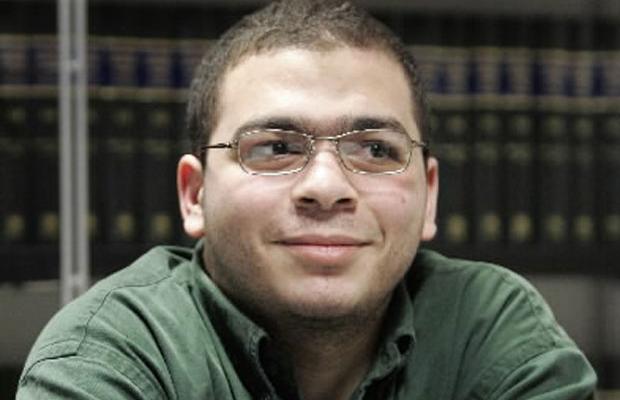 In December 2005, Abdullah Khadr, older brother of Omar, Abdurahman and Abdul Karim Khadr and younger brother of Zaynab, returned to his home in Toronto, Canada after fourteen months of being held in a Pakistan prison without charges. One week later he was arrested in Canada and held without bail, pending extradition to the US. The US had earlier obtained information from the Taliban which suggested to them Abdullah may have been the suicide bomber who killed a Canadian soldier in Kabul in January 2004. In an interview with CBC News on Feb. 25, 2004, Abdullah Khadr said, "If I was the suicide bomber, I wouldn't be doing this interview with you right now."
In December 2005, Abdullah Khadr, older brother of Omar, Abdurahman and Abdul Karim Khadr and younger brother of Zaynab, returned to his home in Toronto, Canada after fourteen months of being held in a Pakistan prison without charges. One week later he was arrested in Canada and held without bail, pending extradition to the US. The US had earlier obtained information from the Taliban which suggested to them Abdullah may have been the suicide bomber who killed a Canadian soldier in Kabul in January 2004. In an interview with CBC News on Feb. 25, 2004, Abdullah Khadr said, "If I was the suicide bomber, I wouldn't be doing this interview with you right now."
This time he was indicted in the US on charges of supplying weapons to Al Qaeda in Pakistan. In August 2006, Khadr's lawyer Dennis Edney filed an application to stay the extradition proceedings, arguing that the US government's evidence against Khadr was inadmissible because it relied on information gathered under torture in Pakistan. Khadr was held in a detention centre for the next five years until his release last August when the stay was granted and the presiding judge called his treatment "both shocking and unjustifiable."
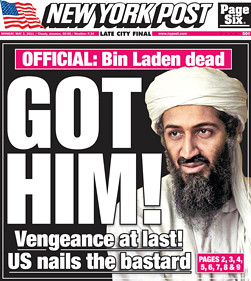 Hours ago, WikiLeaks sent out a tweet noting the US had suspected or known since 2008 that Osama bin Laden might have been living in Abottabad, Pakistan, where he was killed by a US black ops team, JSOC, in a pre-dawn raid on Sunday. The note begs a few questions.
Hours ago, WikiLeaks sent out a tweet noting the US had suspected or known since 2008 that Osama bin Laden might have been living in Abottabad, Pakistan, where he was killed by a US black ops team, JSOC, in a pre-dawn raid on Sunday. The note begs a few questions.
Why was this detail missed when the New York Times, McClatchy Newspapers, Washington Post, and NPR put together coverage? How did this detail not become a headline on The Guardian’s or the Telegraph’s website?
Does it have anything to do with the way the media organizations searched the files? Or, was this small detail in one of the files not covered because of the fear that it might jeopardize efforts to track down bin Laden? Is it possible the New York Times met with the Pentagon and was urged to omit this detail?
The section that is getting attention comes from Abu al-Libi’s leaked detainee assessment report:
Amnesty International has released a statement on the assassination of Osama Bin Laden. They have announced they will be looking into the killing of Bin Laden and others in Pakistan.
Osama Bin Laden, the leader of al-Qaida, has been killed by US forces during an operation in Pakistan, US President Barack Obama has said.
"Osama Bin Laden took credit for and supported acts around the world which amounted to crimes aganist humanity. He also inspired others to commit grave human rights abuses," said Claudio Cordone, Senior Director at Amnesty International.
"His death will put an end to his role in organizing or inspiring such criminal acts. We do not know the full circumstances of his killing and the others with him and we are looking into that."
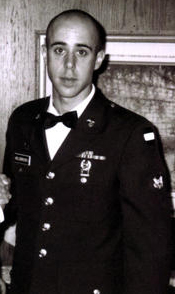 This is our second interview in a series of interviews with former Guantanamo Bay detention camp guards and detainees.
This is our second interview in a series of interviews with former Guantanamo Bay detention camp guards and detainees.
Several current and former U.S. soldiers have expressed interest in speaking publicly about their experience at Guantanamo: including a CIA psychologist, interrogators, guards, and medical personnel. They are disgusted with what they witnessed or took part in at Guantanamo, but declined my request for an interview, because they fear opening themselves up to prosecution by the US government, which required them to sign a Non Disclosure Agreement.
I was also told that many are afraid of being prosecuted for war crimes, since low level soldiers are often the ones who shoulder the brunt of punishment and backlash; whereas higher ranking officials seem to escape scrutiny completely.
Terry Holdbrooks is a former guard at the Guantanamo Bay detention camps. He was stationed at GTMO in 2003 and 2004. During his time there, he converted to Islam. He is now a vocal critic of the camp. You can find him on twitter @BrotherMustafa
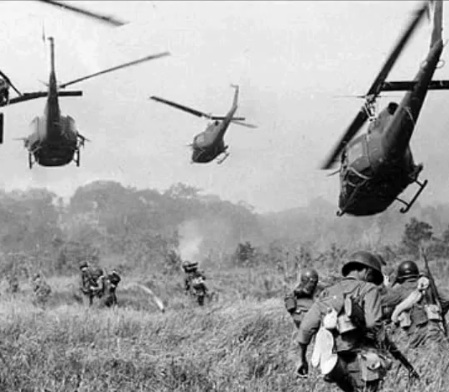 The National Security Archive has, on the fiftieth anniversary of the Bay of Pigs invasion, filed a Freedom of Information Act lawsuit to force the release of the CIA's "Official History of the Bay of Pigs Operation." The lawsuit charges the CIA has "wrongfully withheld" a multi-volume study the Archive requested in 2005 that is "the most important and substantive CIA-produced study of this episode."
The National Security Archive has, on the fiftieth anniversary of the Bay of Pigs invasion, filed a Freedom of Information Act lawsuit to force the release of the CIA's "Official History of the Bay of Pigs Operation." The lawsuit charges the CIA has "wrongfully withheld" a multi-volume study the Archive requested in 2005 that is "the most important and substantive CIA-produced study of this episode."
Director of the Archive's Cuba Documentation Project Peter Kornbluh has called on the CIA to release the report under President Barack Obama's Executive Order 13526 , which states that "no information may remain classified indefinitely." (Of course, denying FOIA requests doesn't mean documents will be classified indefinitely. It just means they aren't getting released now.)
One might wonder, how long does this have to go on before someone goes ahead and declassifies the material? What is the government hiding? Is there any chance someone will just leak the report to WikiLeaks and end this travesty?
The Bay of Pigs invasion is an episode in US foreign policy that is considered to be a sham. Beyond that, it's unclear what has been learned from the incident.
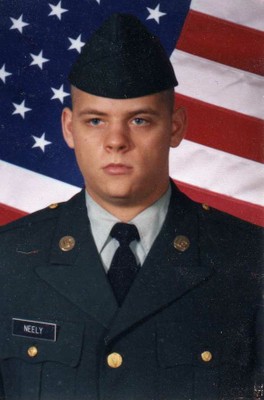 This is our first interview in a series of interviews with former Guantanamo Bay detention camp guards and detainees.
This is our first interview in a series of interviews with former Guantanamo Bay detention camp guards and detainees.
Several current and former U.S. soldiers have expressed interest in speaking publicly about their experience at Guantanamo: including a CIA psychologist, interrogators, guards, and medical personnel. They are disgusted with what they witnessed or took part in at Guantanamo, but declined my request for an interview, because they fear opening themselves up to prosecution by the US government, which required them to sign a Non Disclosure Agreement .
I was also told that many are afraid of being prosecuted for war crimes, since low level soldiers are often the ones who shoulder the brunt of punishment and backlash; whereas higher ranking officials seem to escape scrutiny completely.
Brandon Neely, has been a vocal critic of both Guantanamo Bay, and the war in Iraq. And he speaks from experience, since he was both a guard at Guantanamo during the the first six months the camp was open, and served in Iraq during the US invasion. In the course of his advocacy, he has offered testimony to the Center for Human Rights in the Americas, and appeared in numerous articles and on television programs, including a BBC program that recounts how he contacted two of his former prisoners on Facebook to express remorse for what he did. You can also find him, where I did, on twitter, @BrandonTXNeely.
*Apologies for the first seconds of poor audio quality.
Listen to Part 1 of 8 here
Transcript
 This is our first interview in a series of interviews with former Guantanamo Bay detention camp guards and detainees.
This is our first interview in a series of interviews with former Guantanamo Bay detention camp guards and detainees.
Several current and former U.S. soldiers have expressed interest in speaking publicly about their experience at Guantanamo: including a CIA psychologist, interrogators, guards, and medical personnel. They are disgusted with what they witnessed or took part in at Guantanamo, but declined my request for an interview, because they fear opening themselves up to prosecution by the US government, which required them to sign a Non Disclosure Agreement .
I was also told that many are afraid of being prosecuted for war crimes, since low level soldiers are often the ones who shoulder the brunt of punishment and backlash; whereas higher ranking officials seem to escape scrutiny completely.
Brandon Neely, has been a vocal critic of both Guantanamo Bay, and the war in Iraq. And he speaks from experience, since he was both a guard at Guantanamo during the the first six months the camp was open, and served in Iraq during the US invasion. In the course of his advocacy, he has offered testimony to the Center for Human Rights in the Americas, and appeared in numerous articles and on television programs, including a BBC program that recounts how he contacted two of his former prisoners on Facebook to express remorse for what he did. You can also find him, where I did, on twitter, @BrandonTXNeely.
 This is our first interview in a series of interviews with former Guantanamo Bay detention camp guards and detainees.
This is our first interview in a series of interviews with former Guantanamo Bay detention camp guards and detainees.
Several current and former U.S. soldiers have expressed interest in speaking publicly about their experience at Guantanamo: including a CIA psychologist, interrogators, guards, and medical personnel. They are disgusted with what they witnessed or took part in at Guantanamo, but declined my request for an interview, because they fear opening themselves up to prosecution by the US government, which required them to sign a Non Disclosure Agreement .
I was also told that many are afraid of being prosecuted for war crimes, since low level soldiers are often the ones who shoulder the brunt of punishment and backlash; whereas higher ranking officials seem to escape scrutiny completely.
Brandon Neely, has been a vocal critic of both Guantanamo Bay, and the war in Iraq. And he speaks from experience, since he was both a guard at Guantanamo during the the first six months the camp was open, and served in Iraq during the US invasion. In the course of his advocacy, he has offered testimony to the Center for Human Rights in the Americas, and appeared in numerous articles and on television programs, including a BBC program that recounts how he contacted two of his former prisoners on Facebook to express remorse for what he did. You can also find him, where I did, on twitter, @BrandonTXNeely.
Theme by Danetsoft and Danang Probo Sayekti inspired by Maksimer